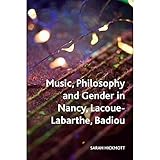Music, Philosophy and Gender in Nancy, Lacoue-Labarthe, Badiou / Sarah Hickmott.
Material type: TextSeries: Crosscurrents : CROSSPublisher: Edinburgh : Edinburgh University Press, [2022]Copyright date: ©2020Description: 1 online resource (256 p.) : 5 B/W illustrationsContent type:
TextSeries: Crosscurrents : CROSSPublisher: Edinburgh : Edinburgh University Press, [2022]Copyright date: ©2020Description: 1 online resource (256 p.) : 5 B/W illustrationsContent type: - 9781474458313
- 9781474458344
- 780.1 23
- online - DeGruyter
| Item type | Current library | Call number | URL | Status | Notes | Barcode | |
|---|---|---|---|---|---|---|---|
 eBook
eBook
|
Biblioteca "Angelicum" Pont. Univ. S.Tommaso d'Aquino Nuvola online | online - DeGruyter (Browse shelf(Opens below)) | Online access | Not for loan (Accesso limitato) | Accesso per gli utenti autorizzati / Access for authorized users | (dgr)9781474458344 |
Frontmatter -- Contents -- Acknowledgements -- Series Editor’s Preface -- Abbreviations -- Prelude -- 1. Music, Mousike, Muses (and Sirens) -- 2. Music, Meaning and Materiality: Nancy’s Corps Sonore -- 3. ‘Catacoustic’ Subjects and the Injustice of Being Born: Lacoue-Labarthe’s Musical Maternal Muse -- 4. Midwives and Madams: Mus(e)ic, Mediation and Badiou’s ‘Universal’ Subject -- 5. From Parnassus to Bayreuth: Staging a Music which is Not One -- Encore: After Music -- Bibliography -- Index
restricted access online access with authorization star
http://purl.org/coar/access_right/c_16ec
Analyses the role of music in the work of Nancy, Lacoue-Labarthe and Badiou, and the role of gender in the philosophy of musicAnalyses the role or characterisation of music in both well-known and lesser-known texts including Á l’écoute, Le Chant des Muses and Five Lessons on WagnerArticulates the stakes of a musico-philosophical interaction, with a central focus on the way gender is deployed, understood or constructed within this nexusAppeals to the growing interest in sound studies and/or sound cultures and an interrogation of the role of music in particular within this broader trendContributes to wider debates about the relation between aesthetics, ethics, philosophy and identity politicsWhat counts as music for contemporary thinkers? Why is music of use to philosophers and how do they use it in their work? How do philosophers decide what music is and what assumptions are uncritically inherited in this move? And what is the philosophical relationship between music and gender?To answer these questions, Sarah Hickmott looks at the way music is used, characterised and understood in the work of Jean-Luc Nancy, Philippe Lacoue-Labarthe and Alain Badiou. Despite the differences in their philosophical-theoretical positions, all of these writers invoke music – both directly and indirectly – to negotiate their relationship to ontology, politics, ethics and aesthetics. Given a longer philosophical history, dating back at least to Plato, of aligning music with the feminine, she also focuses on the way gender is deployed, understood and constructed within the philosophy of music.
Mode of access: Internet via World Wide Web.
In English.
Description based on online resource; title from PDF title page (publisher's Web site, viewed 29. Jun 2022)


